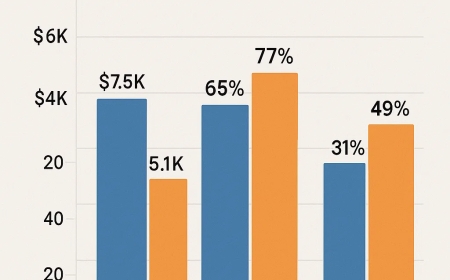Comprehensive Pediatric Care from Compassionate Doctors
Discover how a compassionate pediatric doctor offers comprehensive care—from preventive checkups to chronic illness management—supporting your child at every stage of growth.

When it comes to your childs health, nothing matters more than finding the right support system. A pediatric doctor is more than just a medical providerthey are a trusted partner who guides your childs development from infancy through adolescence. Comprehensive pediatric care involves more than treating illnesses; it focuses on the whole childbody, mind, and emotional well-being.
From regular check-ups and immunizations to developmental screenings and chronic care management, compassionate pediatric doctors offer services tailored to each stage of a childs life. In this article, well explore what comprehensive pediatric care looks like and why compassionate, family-centered care makes all the difference.
What Is Comprehensive Pediatric Care?
Comprehensive pediatric care refers to the full spectrum of medical services a child may needfrom preventive care and developmental support to emergency treatment and chronic condition management. A pediatric doctor delivers this care while prioritizing a nurturing approach that considers both the childs and the familys needs.
Key elements of comprehensive pediatric care:
-
Preventive health services (vaccines, physical exams)
-
Developmental monitoring and milestone checks
-
Diagnosis and treatment of acute illnesses
-
Management of chronic health conditions
-
Mental and emotional health support
-
Nutritional and lifestyle counseling
-
Parental education and guidance
This holistic model ensures that children receive timely, age-appropriate care that supports long-term wellness.
The Role of a Pediatric Doctor
A pediatric doctor is a specialist trained to care for children from birth to age 18 (or sometimes beyond). They understand the unique health needs of growing bodies and developing minds. Pediatricians are highly skilled in diagnosing childhood illnesses, monitoring growth and development, and providing preventive education.
They serve as the first point of contact for parents seeking trusted advice on everything from fevers and rashes to nutrition, behavior, and emotional health. A compassionate pediatric doctor creates a safe and supportive space where children feel at ease and parents feel heard.
Compassion in Pediatric Care: Why It Matters
Children are more likely to thrive when their healthcare providers take the time to listen, comfort, and build trust. A compassionate pediatric doctor knows how to communicate in a child-friendly way, alleviate anxiety, and involve parents in decision-making.
Benefits of compassionate pediatric care:
-
Reduces fear and anxiety in children
-
Encourages open communication and honesty
-
Builds lasting trust between doctor, child, and parent
-
Promotes better adherence to treatments
-
Enhances the overall healthcare experience
Whether its a routine visit or a serious health concern, compassionate care can positively impact a childs long-term relationship with healthcare.
Preventive Care: The Foundation of Pediatric Health
Prevention is at the heart of pediatric care. A pediatric doctor focuses on keeping children healthy rather than only treating them when theyre sick. Through regular well-child visits, doctors track your childs growth, administer immunizations, and provide guidance for healthy living.
Common preventive services include:
-
Immunizations and vaccine schedules
-
Growth and development assessments
-
Vision and hearing screenings
-
Nutritional and activity recommendations
-
Guidance on sleep, safety, and oral health
Preventive care also includes early detection of developmental delays, which is essential for effective early intervention.
Developmental Milestone Monitoring
Children grow and develop at different rates, but there are general milestones most kids achieve around specific ages. A pediatric doctor monitors physical, cognitive, and emotional milestones to ensure your child is progressing appropriately.
Milestone evaluations include:
-
Gross and fine motor skills
-
Language and communication development
-
Social and emotional behaviors
-
Problem-solving and thinking skills
If delays or concerns are detected, your pediatrician may refer your child for further assessment or support services to get them back on track.
Managing Common Childhood Illnesses
Children are prone to a variety of acute illnesses, such as ear infections, strep throat, the flu, and respiratory conditions. A skilled pediatric doctor can quickly assess symptoms, make accurate diagnoses, and prescribe the right treatment plan.
Conditions frequently treated include:
-
Fever and infections
-
Coughs and colds
-
Skin conditions (rashes, eczema)
-
Allergies and asthma
-
Gastrointestinal issues
Having a pediatrician who knows your childs health history ensures quicker, more personalized treatment.
Chronic Care Management
Some children may face ongoing medical conditions that require continuous monitoring and specialized care. A pediatric doctor coordinates all aspects of chronic care, including medication, lifestyle support, and referrals to specialists when needed.
Common chronic conditions in children:
-
Asthma and allergies
-
Diabetes
-
ADHD and learning disabilities
-
Epilepsy
-
Congenital disorders
Compassionate pediatricians help families navigate these challenges with empathy, education, and consistent follow-up care.
Mental and Emotional Well-Being
Mental health is just as important as physical health. Pediatric doctors are increasingly focused on emotional and behavioral development, identifying early signs of anxiety, depression, or other mental health concerns.
Mental health services include:
-
Behavioral screenings
-
Emotional health assessments
-
Guidance on stress, peer pressure, and social skills
-
Referrals to child psychologists or counselors
-
Ongoing support for families
By addressing mental health proactively, pediatricians help children build emotional resilience and confidence.
Adolescent Care: Meeting Teen Needs with Sensitivity
As children grow into adolescents, their health needs shift. A compassionate pediatric doctor helps teens navigate the changes of puberty, peer relationships, and emotional stress while maintaining trust and confidentiality.
Topics often addressed during teen visits:
-
Reproductive and sexual health education
-
Menstrual and hormonal concerns
-
Mental health and substance use
-
Nutrition and body image
-
Transitioning to adult healthcare providers
A judgment-free environment empowers teens to speak openly and take an active role in their health.
Educating and Empowering Parents
A big part of comprehensive pediatric care involves educating parents so they can make informed decisions. A pediatric doctor provides evidence-based guidance, listens to your concerns, and collaborates with you to support your childs health.
Parental guidance may include:
-
Feeding and nutrition tips for infants and toddlers
-
Sleep training and behavioral management
-
Advice on school readiness and learning challenges
-
Navigating puberty and teen independence
-
Injury prevention and emergency preparedness
When parents feel confident and supported, children benefit from healthier, more secure environments.
Continuity of Care: Building Long-Term Trust
Children feel safer and more comfortable when they see the same pediatric doctor over time. Continuity of care fosters stronger relationships and allows doctors to better understand your childs personality, medical history, and evolving needs.
Benefits of continuity:
-
More accurate diagnoses and faster treatment
-
Better management of chronic or recurring conditions
-
Improved communication and follow-up
-
Higher satisfaction among children and parents
A long-term relationship with a pediatric doctor offers peace of mind and consistency as your child grows.
Final Thoughts
Comprehensive pediatric care goes beyond the basics of treating illnesses. Its about supporting your childs physical, emotional, and developmental needs in a compassionate, consistent, and personalized way. A dedicated pediatric doctor understands the value of building trust with both the child and the family, creating a strong foundation for lifelong wellness.
Whether your child is coming in for a routine checkup, treatment for a chronic condition, or emotional support, a pediatricians role is to guide your family every step of the way. With comprehensive care from a compassionate doctor, your child will have the tools and support needed to grow into a healthy, happy adult.








&srotate=0)























/assets/production/practices/d3eb2cb997dab7b074b251ed3fbc393d54698f2b/images/2771321.jpg)



